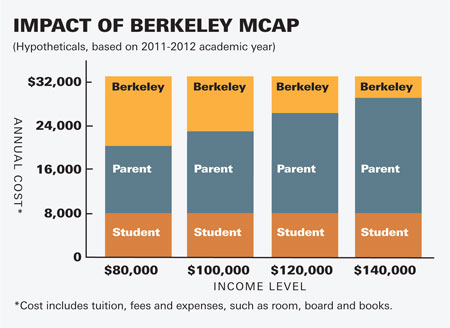New UC Berkeley financial-aid plan targets squeeze on middle-class students
Thousands of UC Berkeley undergraduates from middle-income families will get a helping hand from a new, far-reaching financial-aid plan hailed by Chancellor Robert Birgeneau as "the first program of this sort at any public university in the United States."
December 14, 2011
Updated: The information on this page is outdated. These are the types of financial aid currently available.
Thousands of UC Berkeley undergraduates from middle-income families will get a helping hand from a new, far-reaching financial-aid plan hailed by Chancellor Robert Birgeneau as “the first program of this sort at any public university in the United States.”
Unveiled at a news conference Wednesday morning, the Berkeley Middle Class Access Plan, or MCAP, caps the total annual cost of an eligible student’s education — from tuition and fees to expenses including room, board and books — at 15 percent of the family’s total income. Families with incomes from $80,000 to $140,000 and assets typical of that range are eligible for the program, which will provide grants beginning with the fall 2012 semester.
The UC systemwide Blue and Gold Opportunity Plan offers aid to students with annual family incomes of $80,000 or less. And thanks to a combination of state and federal grants and other aid administered by the campus, Vice Chancellor Frank Yeary noted Wednesday, more than four in 10 Berkeley undergrads “pay effectively no tuition.”
Both at Berkeley and throughout the UC system, financial aid “works marvelously well for low-income families,” Birgeneau said. “We’ve been very successful in keeping the costs of education down for low-income families, and this new program is to extend that to middle-income families.”
Higher education and the middle class
Campus launches middle-class financial aid plan (press release)
Berkeley MCAP Frequently Asked Questions
Financial Aid and Scholarships Office: About Berkeley MCAP
From the Public Policy Institute of California:
To help offset tuition increases, UC Berkeley last year introduced grants averaging $2,500 for students from families with incomes below $120,000. The new program covers many thousands more students, and the vast majority of those in the $80,000-$120,000 income range already getting assistance will see a significant increase, according to campus officials.
The 15 percent cap means that a family whose income is $120,000, for example, will now pay no more than $18,000 in total annual costs to send a student to Berkeley.
Birgeneau has long identified the squeeze on middle-class students— caught between rising tuitions, the high cost of living in California and a stalled economy — as a crucial issue for the campus. Financial aid to low-income students, funded in part by tuition hikes, has remained at previous levels. The challenge for Berkeley has been how to maintain access for those with incomes too high to qualify for aid, but too low to afford a Berkeley education without it.
The chancellor “personally realized we really had to do something,” he said, following a speech he gave two years ago on the shrinking access to higher education for middle-income students. The audience of 1,000 people, Birgeneau recalled, “stood up and clapped.”
 Campus officials believe that roughly one in every four Berkeley undergrads come from families in this income range. Residents of other states will also be eligible, though Berkeley MCAP will consider only the equivalent of costs for California residents — about $32,600, including tuition and fees of $12,834. (All students, regardless of income, are expected to contribute an average of $8,900 each year toward their educations, a self-help level far below the nationwide average.) The program will not cover international students.
Campus officials believe that roughly one in every four Berkeley undergrads come from families in this income range. Residents of other states will also be eligible, though Berkeley MCAP will consider only the equivalent of costs for California residents — about $32,600, including tuition and fees of $12,834. (All students, regardless of income, are expected to contribute an average of $8,900 each year toward their educations, a self-help level far below the nationwide average.) The program will not cover international students.
The costs of the Berkeley MCAP program, which Yeary estimated at between $10 million and $12 million a year, will be paid for by philanthropic donations and added revenue from out-of-state students, officials said, adding that the program will not be affected by yesterday’s announcement of a new, $100 million state-funding cut to the UC system.
Birgeneau, putting the emphasis on access in describing the program, said the campus is “trying to do the very best we can to make sure that every qualified, talented Californian will be able to attend” UC Berkeley.
Public universities, he said, are “the gateway to the American Dream, and the engine of future economic growth here in the state of California. We are continuing to do absolutely everything we can to serve the greater good through steps to preserve both the excellence and the affordability of our university.”